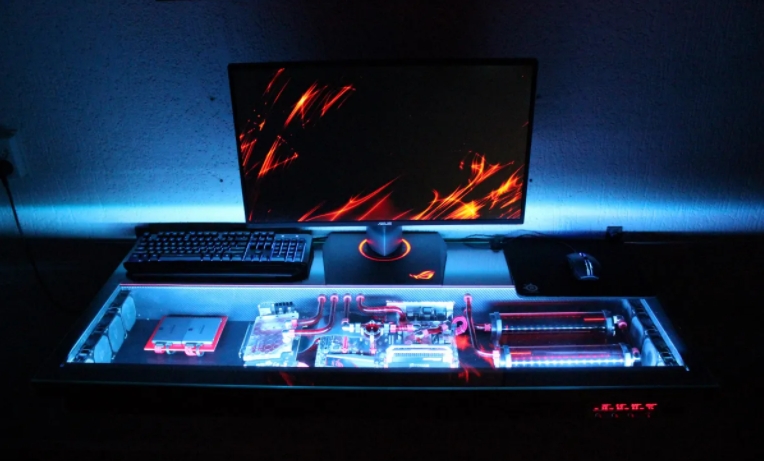As computer setups become increasingly more streamlined and user-focused, Desk PC cases have emerged as a game-changer in the world of custom-built computers. Rather than relying on traditional tower cases, these innovative solutions integrate all of your computer’s hardware directly into your desk. This article explores the benefits of Desk PC cases, their compatibility with hardware components, cooling solutions, and how they compare to traditional cases.
A Desk PC case integrates your computer's components, such as the motherboard, power supply, and cooling system, into a specially designed desk. These desks are built with compartments to house all of the necessary hardware, keeping everything organized and visually appealing. This type of case offers a seamless blend of form and function, creating an all-in-one computing station.

One of the standout benefits of Desk PC cases is the ability to save space. By embedding the computer’s components within the desk itself, you eliminate the need for a separate, bulky tower. This provides:
More Desk Space: Traditional towers take up valuable space either on or under the desk, but a Desk PC case consolidates everything, leaving more room for monitors, accessories, and workspace.
Clutter-Free Aesthetics: With everything neatly hidden within the desk, cables and components are organized, giving your workspace a clean and modern look.
Despite the compact nature of a Desk PC case, these systems are built with effective cooling in mind. Some key points regarding cooling in Desk PC setups include:
Large Radiator Support: Many Desk PC cases are designed to accommodate water cooling solutions, with room for radiators up to 360mm or even larger. This makes it perfect for high-performance builds that need additional cooling.
Ample Fan Support: Depending on the model, Desk PC cases often allow for multiple fans to be installed across the desk chassis, ensuring excellent airflow across all components.
Direct Cooling Path: Desk PC designs are often better ventilated than traditional cases, with airflow paths that directly target critical components like the CPU, GPU, and power supply.
Desk PC cases are built to support a wide range of hardware, making them compatible with high-end components. Here are the main compatibility factors:
Motherboard Support: These cases typically support full-sized ATX, Micro-ATX, and Mini-ITX motherboards, allowing flexibility for various builds. Some larger Desk PC cases may even accommodate E-ATX motherboards, offering full compatibility with the most powerful gaming and workstation builds.
Multiple Storage Options: Whether you need space for multiple SSDs, HDDs, or a combination of both, Desk PC cases offer plenty of room for expansive storage setups.
Graphics Card Length: Desk PC cases can typically accommodate long, high-performance GPUs—many support GPUs up to 350mm or more.
Desk PC cases offer a unique and highly customizable design. Whether you're looking for a minimalist look or a vibrant gaming station, Desk PC setups allow you to incorporate personalized elements, such as:
RGB Lighting: Many Desk PC cases come with RGB lighting options or the ability to add customizable lighting strips to the inside of the case.
Tempered Glass Panels: With glass tops or side panels, Desk PC cases give you the ability to showcase your hardware and lighting setups, turning your desk into a focal point of your room.
Wood Finishes: Some desk cases even come with stylish wood or metal finishes, blending natural elements with high-tech hardware for a modern and sleek look.
Desk PC Case: Integrates the hardware into the desk, freeing up more space in your room or office by eliminating the need for a separate tower case.
Traditional Case: Requires dedicated space for a bulky tower, often under the desk, which can take up legroom and contribute to a cluttered setup.
Desk PC Case: Can provide superior airflow and space for larger cooling systems, such as water cooling and multiple fans. Larger cases can distribute heat more effectively thanks to their horizontal design.
Traditional Case: While some high-end tower cases offer excellent cooling, they are often more restricted in airflow, especially in smaller or mid-tower cases.
Desk PC Case: Offers a modern and streamlined look. With the ability to showcase your components under a glass panel, Desk PC setups can serve as a stylish centerpiece for your room.
Traditional Case: While some tower cases offer great aesthetics with tempered glass and RGB, they don’t provide the integrated and clutter-free look of a Desk PC case.
Desk PC Case: Offers more customization in terms of desk design, lighting, and hardware placement. With a Desk PC case, you can create a setup that’s uniquely yours.
Traditional Case: While still customizable, traditional cases are limited by their vertical design, offering less freedom for a personalized and creative setup.
Desk PC cases offer an innovative and stylish alternative to traditional tower cases, providing superior space-saving capabilities, advanced cooling solutions, and customizable designs. Whether you're a gamer, a content creator, or simply someone looking to declutter your workspace, Desk PC cases provide an exciting way to blend aesthetics with functionality. With support for a wide range of hardware, including large motherboards and powerful GPUs, Desk PC cases are becoming the future of high-performance computing setups.
If you're ready to transform your workspace into a sleek, modern, and high-functioning tech hub, a Desk PC case might just be the perfect choice for you.